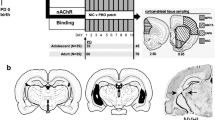Abstract.
Rationale: Acute and chronic systemic nicotine administration has been shown to cause significant spatial memory improvement. The critical nicotinic receptor subtypes for this effect and their location are still being determined. Nicotinic receptors in the ventral hippocampus have been found to be critically involved in memory. Acute ventral hippocampal infusions of dihydro-β-erythroidine (DHβE), an α4β2 nicotinic receptor antagonist, impaired spatial memory of rats in the radial-arm maze. Objectives: The current study used chronic ventral hippocampal infusion of DHβE as a model of nicotinic receptor loss such as that which occurs in Alzheimer's disease. The therapeutic effect of systemic nicotine treatment in reversing the DHβE-induced memory impairment was determined. Methods: Rats were pretrained to asymptotic levels of performance on the eight-arm radial maze. Then, they were implanted with bilateral infusion cannulae in the ventral hippocampus, through which 0, 33.3, or 100 µg/side/day of DHβE was continuously infused for 4 weeks. The rats were retested on the eight-arm maze throughout infusion period and after withdrawal, and the interaction of acute systemic nicotine injections on memory was tested. Results: The higher (100 µg/side/day) but not the lower (33.3 µg/side/day) DHβE dose caused a significant spatial memory impairment. Acute systemic nicotine injections (0, 0.1, 0.2, and 0.4 mg/kg, subcutaneous) attenuated the memory impairing effects of 100 µg/side/day of DHβE. There was no significant effect on response latency with the chronic DHβE infusion. Acute systemic nicotine infusions did significantly speed responding, an effect which was reversed by chronic hippocampal infusions of DHβE. After withdrawal there were no significant lasting effects on choice accuracy or response latency. Wet-dog shakes were significantly elevated during chronic hippocampal DHβE administration with no effect during the withdrawal period. Conclusions: These results indicate that chronic inhibition of a subset of nicotinic receptors in the hippocampus results in a significant impairment in the spatial memory choice accuracy. The ability of nicotine to attenuate the impairment supports the development of nicotinic agonist therapy of syndromes, such as Alzheimer's disease, that involve a chronic decrease in the activity of the α4β2 nicotinic receptors and memory impairment.
Similar content being viewed by others
Author information
Authors and Affiliations
Additional information
Electronic Publication
Rights and permissions
About this article
Cite this article
Arthur, D., Levin, E.D. Chronic inhibition of α4β2 nicotinic receptors in the ventral hippocampus of rats: impacts on memory and nicotine response. Psychopharmacology 160, 140–145 (2002). https://doi.org/10.1007/s00213-001-0961-6
Received:
Accepted:
Issue Date:
DOI: https://doi.org/10.1007/s00213-001-0961-6




